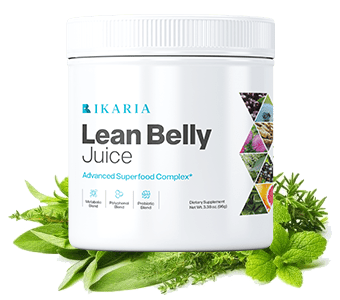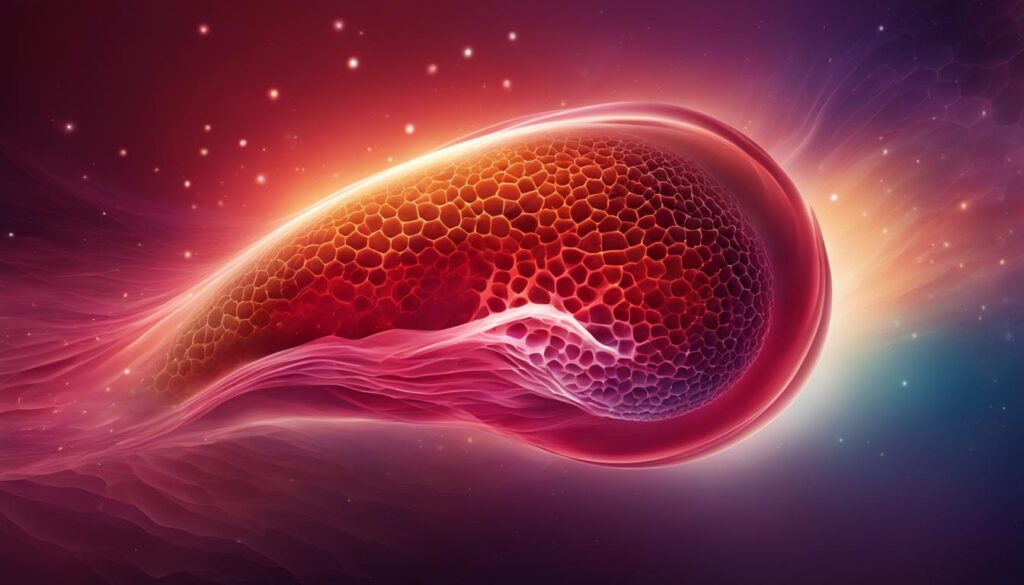
The liver is an incredibly important organ that plays a vital role in our overall health and well-being. Located on the right side of the upper body, below the lungs, the liver is the largest internal organ, weighing between 3 and 5 pounds.
Our liver consists of two lobes – the larger right lobe and the smaller left lobe. It performs over 500 essential functions, including filtering the blood, producing bile, storing nutrients, and detoxifying harmful substances. Additionally, the liver has the amazing ability to regenerate itself.
However, liver diseases and damage can occur due to various factors such as hepatitis, fatty liver disease, alcohol abuse, and certain medications. That’s why it’s crucial to understand how the liver works and take steps to maintain its health.
Key Takeaways:
- The liver is the largest internal organ and plays a vital role in overall health.
- It filters the blood, produces bile, stores nutrients, and detoxifies harmful substances.
- Liver diseases and damage can occur due to factors like hepatitis, fatty liver disease, and alcohol abuse.
- The liver has the ability to regenerate itself.
- Understanding how the liver works and taking steps to maintain its health is crucial for optimal well-being.
The Function of the Liver
The liver, being the largest internal organ in the body, performs numerous essential functions that are vital for overall health. Understanding the function of the liver is crucial for maintaining optimal well-being. Here are some key roles that the liver plays:
Bile Production
The liver produces bile, a substance that helps in the digestion and absorption of fats. Bile is stored in the gallbladder and released into the small intestine when needed. This process aids in the breakdown and absorption of dietary fats, allowing the body to utilize them for energy and other functions.
Blood Filtration
The liver acts as a filter, removing toxins, medications, and other harmful substances from the bloodstream. It helps to detoxify these substances and prevent them from circulating throughout the body. The liver also breaks down and eliminates waste products, keeping the blood clean and free from harmful toxins.
Nutrient Processing
Another important function of the liver is metabolizing nutrients. It processes carbohydrates, proteins, and fats, converting them into forms that can be utilized by the body. The liver also stores vitamins, minerals, and glycogen, releasing them into the bloodstream as needed. This ensures a constant supply of nutrients for energy production and other bodily functions.
Waste Elimination
The liver plays a crucial role in eliminating waste products from the body. It converts ammonia, a toxic byproduct of protein metabolism, into urea, which is then excreted in urine. The liver also helps in the elimination of bilirubin, a waste product from the breakdown of red blood cells. This ensures the proper functioning of the body’s waste elimination processes.
In summary, the liver performs a range of functions that are essential for overall health. From bile production and blood filtration to nutrient processing and waste elimination, the liver plays a vital role in maintaining optimal well-being. Understanding the function of the liver and taking steps to support its health is crucial for a healthy and vibrant life.

Common Liver Diseases and Damage
The liver is a complex organ that can be affected by various diseases and conditions, leading to impaired function and potential damage. Understanding the common liver diseases and their impact is essential for early detection, prevention, and treatment.
Hepatitis: Hepatitis refers to the inflammation of the liver, which can be caused by viral infections (such as hepatitis A, B, or C) or non-viral factors like alcohol abuse, autoimmune disorders, or certain medications. Hepatitis can lead to liver damage and, if left untreated, can progress to liver failure.
Fatty Liver Disease: Fatty liver disease is characterized by the accumulation of fat in liver cells. It can be caused by obesity, excessive alcohol consumption, high cholesterol levels, or type 2 diabetes. If not managed, fatty liver disease can progress to more severe conditions such as non-alcoholic steatohepatitis (NASH) and cirrhosis.
Liver Damage: Liver damage can occur due to various factors including alcohol abuse, medication toxicity, autoimmune disorders, and genetic conditions. Prolonged or excessive alcohol consumption, in particular, can result in alcoholic liver disease, causing inflammation and scarring of liver tissue. Medications like acetaminophen, when taken in high doses, can also lead to liver damage.
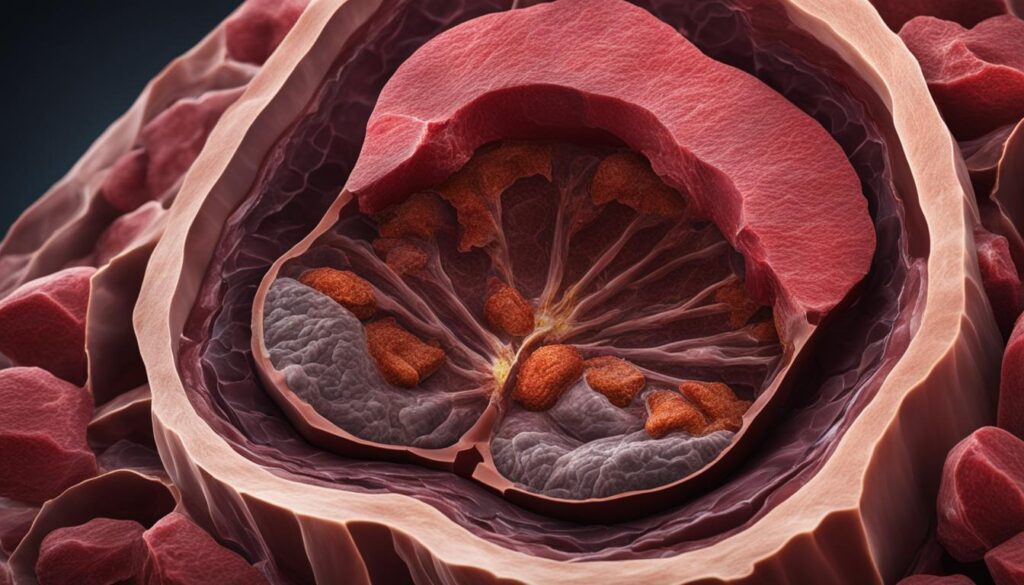
In severe cases, liver failure may occur, wherein the liver is unable to perform its vital functions. Liver failure can be life-threatening and may require immediate medical intervention such as a liver transplant. It is important to recognize the symptoms of liver diseases, seek medical advice, and adopt a healthy lifestyle to protect and maintain liver health.
Maintaining Liver Health
Maintaining liver health is crucial for overall well-being and can be achieved through a combination of adopting a healthy lifestyle, following a balanced diet, staying hydrated, engaging in regular exercise, and quitting smoking. Taking these steps can help support liver function and promote optimal liver health.
Healthy Lifestyle
One of the key factors in maintaining liver health is leading a healthy lifestyle. This includes avoiding excessive alcohol consumption, which can lead to liver damage. It is also important to limit the intake of processed foods and high-sugar beverages, as these can contribute to fatty liver disease. Prioritizing quality sleep, managing stress levels, and maintaining a healthy weight through regular physical activity are also essential for liver health.
Balanced Diet
A balanced diet plays a vital role in supporting liver health. It is important to include a variety of fruits, vegetables, whole grains, and lean proteins in your daily meals. These foods provide essential nutrients and antioxidants that help protect the liver from damage. Including liver-loving foods such as garlic, onions, cruciferous vegetables, and citrus fruits can also be beneficial for liver health.
Hydration and Exercise
Staying hydrated is important for liver health as it helps with the efficient removal of toxins from the body. Aim to drink an adequate amount of water throughout the day to support proper liver function. Regular exercise, even moderate physical activity, can also have a positive impact on liver health. Exercise helps improve blood circulation and can assist in reducing fatty deposits in the liver.
Smoking Cessation
Quitting smoking is essential for liver health. Smoking increases the burden on the liver and can lead to further damage. By quitting smoking, you can reduce the risk of liver diseases and promote overall well-being.
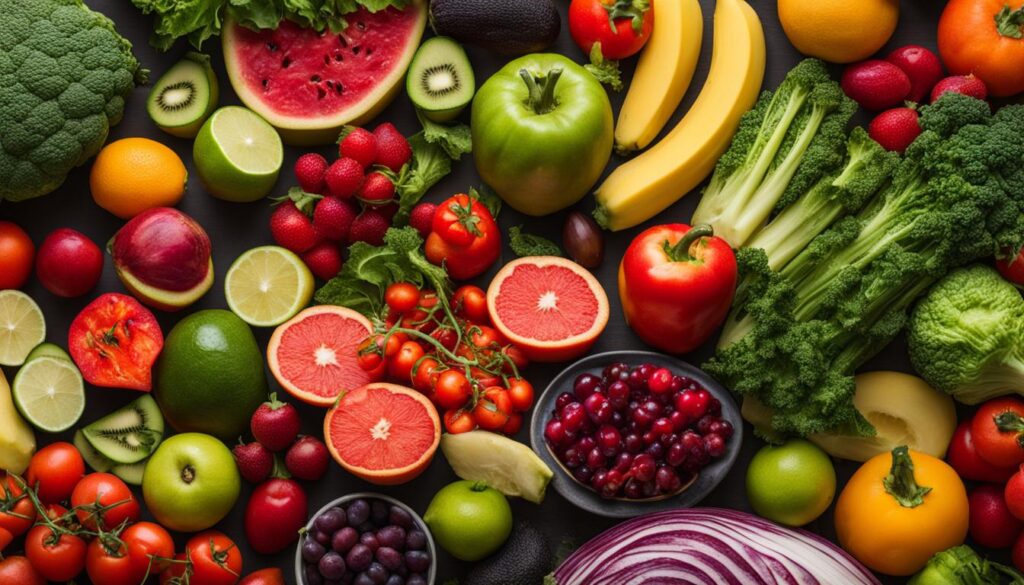
Table: Liver-Healthy Foods
| Food | Benefits |
|---|---|
| Garlic | Contains compounds that help activate liver enzymes and support detoxification |
| Leafy greens (spinach, kale) | Rich in antioxidants and fiber, which promote liver health |
| Berries (blueberries, raspberries) | High in antioxidants that protect liver cells from damage |
| Fatty fish (salmon, mackerel) | Rich in omega-3 fatty acids, which have anti-inflammatory properties |
| Turmeric | Contains curcumin, a compound that helps reduce liver inflammation |
Herbs and Supplements for Liver Health
When it comes to supporting liver health, certain herbs and supplements have shown promising benefits. Incorporating liver-loving herbs into your diet or taking them as supplements may help support the liver’s natural detoxification processes and overall well-being.
“Milk thistle, turmeric, and dandelion root are among the most popular liver-loving herbs.”
Milk thistle: Also known as Silybum marianum, milk thistle contains a compound called silymarin, which has been shown to have liver-protective properties. Silymarin may help promote liver cell regeneration, reduce inflammation, and protect against certain toxins.
Turmeric: Curcumin, the active ingredient in turmeric, has powerful antioxidant and anti-inflammatory properties. Studies suggest that turmeric may help reduce liver damage caused by toxins and oxidative stress, as well as support liver cell regeneration.
Dandelion root: Dandelion root is known for its diuretic and detoxifying properties. It may help stimulate bile production, improve liver function, and promote the elimination of toxins from the body. Dandelion root also contains antioxidants that can help protect liver cells from damage.
It’s important to note that while these herbs have shown potential benefits for liver health, it’s always advisable to consult with a healthcare professional before starting any new supplementation regimen. They can provide personalized guidance based on your individual health needs and any potential interactions with medications you may be taking.
| Herb/Supplement | Benefits | Recommended Dosage |
|---|---|---|
| Milk thistle | Supports liver cell regeneration, reduces inflammation, protects against toxins | Standardized extract: 200-400 mg/day |
| Turmeric | Reduces liver damage caused by toxins and oxidative stress, supports liver cell regeneration | Standardized extract (curcumin): 500-2,000 mg/day |
| Dandelion root | Stimulates bile production, improves liver function, promotes detoxification | Root extract: 500-2,000 mg/day |
Remember, maintaining liver health is not solely dependent on herbs and supplements. Adopting a healthy lifestyle that includes a balanced diet, regular exercise, and avoiding harmful habits like excessive alcohol consumption and smoking is crucial for overall liver health. Regular check-ups and consultations with healthcare professionals are also essential for early detection and management of liver-related issues.
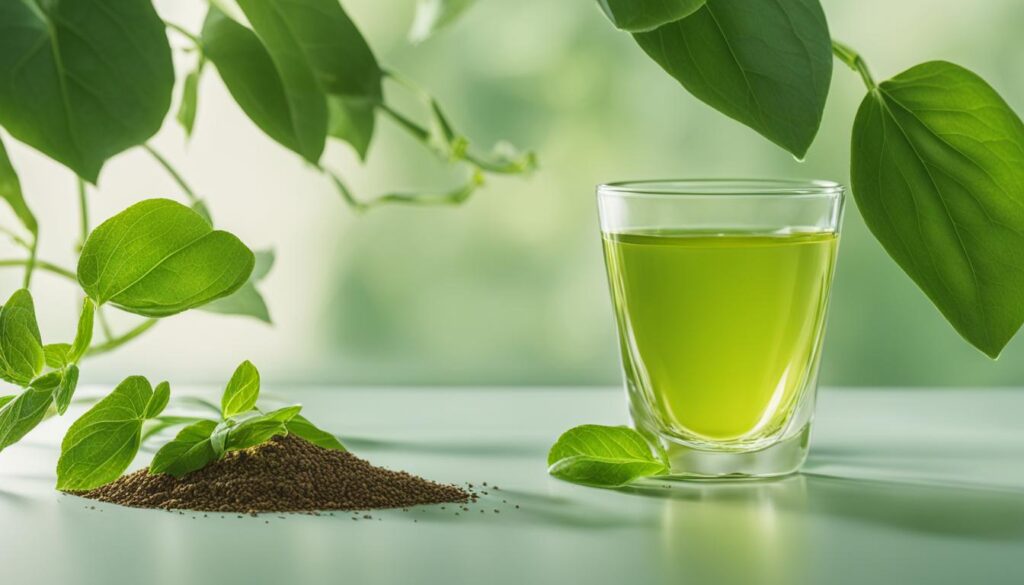
Conclusion
In conclusion, taking care of your liver is essential for optimal liver health and overall well-being. With its vital functions in filtering blood, producing bile, storing nutrients, and detoxifying harmful substances, the liver plays a crucial role in maintaining a healthy body.
To promote liver health, it is important to adopt a healthy lifestyle. This includes a balanced diet that provides essential nutrients for the liver’s optimal functioning. Regular exercise aids in improving liver function and supporting overall health. Avoiding harmful habits, such as smoking, is also important to reduce the burden on the liver and prevent further damage.
Regular check-ups and consultations with healthcare professionals are crucial for early detection and management of liver-related issues. By staying vigilant and seeking medical advice when needed, you can ensure that any liver problems are addressed promptly.
Remember, your liver is a resilient organ that has the ability to regenerate itself. By taking steps to maintain its health, you can enjoy optimal liver function and a healthy and vibrant life.
FAQ
What is the liver and where is it located in the body?
The liver is the largest internal organ in the body and is located on the right side of the upper body, below the lungs.
How much does the liver weigh?
The liver weighs between 3 and 5 pounds.
What are the functions of the liver?
The liver plays a vital role in overall health by filtering the blood, producing bile, storing nutrients, and detoxifying harmful substances. It also has the ability to regenerate itself and can perform more than 500 essential functions.
What can cause liver diseases and damage?
Liver diseases and damage can occur due to factors such as hepatitis, fatty liver disease, alcohol abuse, and certain medications.
How can I maintain liver health?
Maintaining liver health is essential for overall well-being. Adopting a healthy lifestyle, including a balanced diet, regular exercise, staying hydrated, and quitting smoking, is key to supporting liver function.
Are there any herbs and supplements that can support liver health?
Yes, milk thistle, turmeric, and dandelion root are known for their liver-protective properties and can support the natural detoxification processes of the liver. However, it is important to consult with a healthcare professional before starting any new supplementation regimen.
Why is taking care of the liver important?
Taking care of the liver is essential for a healthy and vibrant life. The liver plays a crucial role in maintaining overall health, and by understanding its functions, being aware of common liver diseases and damage, and taking steps to promote liver health, individuals can support liver function and maintain optimal liver health.
How does the liver function in maintaining a healthy body?
The liver plays a crucial role in filtering and processing blood as it flows through the body. It detoxifies chemicals and metabolizes drugs, secretes bile that ends up back in the intestines, and makes proteins important for blood clotting and other functions.
What is the liver’s role in the digestive system?
The liver aids in digestion by producing bile, which is stored in the gallbladder and released into the small intestine. Bile helps to break down fats and aids in the absorption of fat-soluble vitamins.
What are common liver disorders?
Some common liver disorders include nonalcoholic fatty liver disease, chronic liver disease, and liver cirrhosis caused by various factors such as alcohol consumption, viral hepatitis, and obesity.
How does the liver regenerate itself?
The liver possesses the remarkable ability to regenerate itself. Even if two-thirds of the liver is removed, it can regenerate into a whole new organ within a matter of weeks.
How is the blood supply to the liver regulated?
The liver receives a dual blood supply from the hepatic artery and the portal vein. The portal vein brings in blood rich in digestive byproducts, while the hepatic artery supplies oxygen-rich blood to the liver.
What are liver function tests and why are they important?
Liver function tests are blood tests used to help diagnose and monitor liver disease or damage. They measure the levels of certain enzymes and proteins in your blood.
How does the liver play a role in the storage of nutrients?
The liver stores key nutrients such as vitamins, minerals, and sugars, and releases them into the bloodstream as needed to maintain normal body functions.
What are the effects of alcohol and other substances on the liver?
Excessive consumption of alcohol and certain substances can lead to liver damage and diseases, impacting its ability to function effectively.
How does the liver assist in the body’s immune system?
The liver helps the body fight infections by producing immune factors and removing bacteria from the bloodstream.


